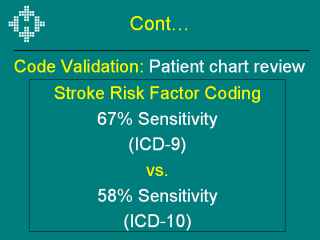| front |1 |2 |3 |4 |5 |6 |7 |8 |9 |10 |11 |12 |13 |14 |15 |16 |17 |18 |19 |20 |21 |22 |23 |24 |25 |26 |27 |28 |29 |30 |review |
 |
In the stroke risk factor validation, also using a patient chart review process, although global sensitivity was lower with ICD-10, coding was generally found to be similar between ICD-9 and 10. Atrial fibrillation, coronary artery disease/ischemic heart disease, diabetes mellitus, and hypertension were all identified with a high degree of confidence, as well as, resulted in a high specificity and sensitivity with regard to coding. Alternatively, cerebrovascular disease, hyperlipidemia, renal failure, and tobacco use were identified to a lesser degree and coding results ranged from poor to excellent, with low sensitivity but high specificity.
The authors suggest that, although their data provides evidence that ICD-10 does not out-perform ICD-9 in coding accuracy for stroke and stroke risk factors, ICD-10's greater clarity in definitions may provide a qualitative advantage. |